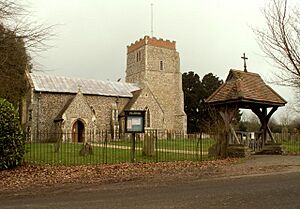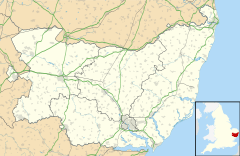Dallinghoo facts for kids
Quick facts for kids Dallinghoo |
|
|---|---|
 St. Mary's church, Dallinghoo |
|
| Population | 171 (2011) |
| District |
|
| Shire county | |
| Region | |
| Country | England |
| Sovereign state | United Kingdom |
| Post town | Woodbridge |
| Postcode district | IP13 |
| Dialling code | 01728 |
| EU Parliament | East of England |
| UK Parliament |
|
Dallinghoo is a small village and civil parish in Suffolk, England. It is located about 3 miles (5 km) north of Woodbridge in East Suffolk. In 2011, the village had a population of 171 people. A civil parish is a local area with its own council, which helps manage local services and community life.
Contents
A Glimpse into Dallinghoo's Past
On April 1, 1985, a very small area called Dallinghoo Wield became part of Dallinghoo parish. Before this, Dallinghoo Wield was known for being one of the tiniest civil parishes in England. It was only 38 acres big and had no residents.
Where is Dallinghoo Located?
Dallinghoo is made up of a few main roads. Church Road runs to the west, and Pound Hill is to the south. The village branches out towards the northeast from its center. The Dallinghoo Village Hall, a community meeting place, is found on Church Road. It's close to where Church Road meets Pound Hill. You can find it a little north of the main village area.
Important Buildings in Dallinghoo
Dallinghoo's church was once a very large building. It used to have a tall tower in the middle. However, part of the church, called the chancel, has since been removed. This church also had special connections with Letheringham Abbey, which was a religious house nearby.
Famous People from Dallinghoo
Dallinghoo is famous for being the birthplace of Francis Light. He was an important figure who founded Penang in Malaysia. Francis Light was also the father of William Light. William Light later became known for founding the city of Adelaide in Australia.
Exciting Discoveries in Dallinghoo
Dallinghoo made headlines in 2009 because of an amazing find. A large collection of ancient gold coins was discovered in a field. These coins belonged to the Iceni tribe, who lived in Britain a very long time ago. The coins were worth a lot of money, about £500,000!


